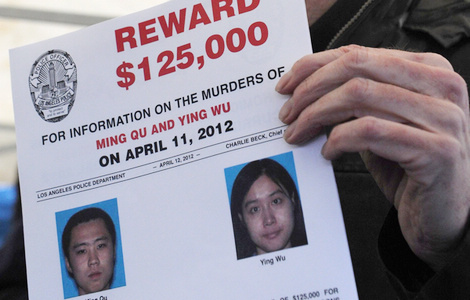 |
|
|
|
|||||||||||
China's smartphone industry is at risk of becoming embroiled in intellectual property disputes since many of the most important patents are held by international companies such as Google Inc and Microsoft Corp, according to a White Paper issued on Friday.
The Mobile Terminal White Paper, issued by the China Academy of Telecommunication Research, a branch under the Ministry of Industry and Information Technology, said China shipped more than 110 million smartphones in 2011, a figure larger than the combined number of smartphones that were shipped in China in the past several years.
The country is the world's largest production base for mobile devices, it said.
In 2011, China produced 1.13 billion mobile devices, including mobile phones and tablet computers. Those made up about 70 percent of the devices that were shipped globally.
Domestic brands, such as ZTE Corp, Huawei Technologies Co Ltd and Lenovo Group Ltd, made significant progress in producing mobile phones, especially mid-to low-end mobile phones. ZTE's mobile device business contributed 31.3 percent, or 26.93 billion yuan ($4.3 billion), of its total revenue in 2011.
Domestic phone makers have gradually squeezed their overseas counterparts' market share.
In 2005, international mobile phone makers occupied more than half of the Chinese market. But in 2011, China shipped 455 million mobile phones, among which domestic brands made up 72 percent.
Telecom experts have warned Chinese companies that they may be hit with charges of violating intellectual property rights.
Most smartphone patents held by domestic makers have to do with designs or physical forms and few are related to the central technologies.
Xu Zhiyuan, senior engineer at the China Academy of Telecommunication Research, said international mobile companies often invest heavily in acquiring patents in the hopes of curbing competition through the use of patent lawsuits.
"In the mobile device industry, there are patent lawsuits everywhere," Xu said. "The disputes surrounding Google's Android mobile operating system are one of the current topics of discussion."
Though Chinese telecom carriers, as well as some Internet companies such as Baidu Inc and Alibaba Group, have developed their own mobile operating systems, their combined market share lags far behind the share enjoyed by the three most prominent international operating systems — Apple's iOS, Google's Android and Microsoft's Windows Phone.
In the fourth quarter of last year, more than 68 percent of the smartphones sold in China ran on the Android operating system, according to a report by the Beijing-research firm Analysys International. Nokia's Symbian operating system holds a market share of 18.7 percent and Apple's iOS has a 5.7 percent share.
"As more Chinese mobile phones pour into the global market, it is much more likely that international rivals will use intellectual property rights as a weapon in competition," Xu said.
"Chinese companies should watch out."
The reporter can be reached at shenjingting@chinadaily.com.cn

|

|

|

|

|

|